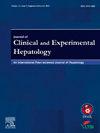The Integration of Multi-omics With Artificial Intelligence in Hepatology: A Comprehensive Review of Personalized Medicine, Biomarker Identification, and Drug Discovery
IF 3.2
Q2 GASTROENTEROLOGY & HEPATOLOGY
Journal of Clinical and Experimental Hepatology
Pub Date : 2025-06-15
DOI:10.1016/j.jceh.2025.102611
引用次数: 0
Abstract
The evolution of high-throughput technologies has expanded the role of multi-omics in hepatology, moving away from traditional hypothesis-driven research toward integrative, data-driven models. However, high cost and resource intensity have limited widespread adoption. The multi-omics datasets for liver diseases are still relatively small. Progress has been made in integrating a few omics types, particularly in combining genomics with transcriptomics, proteomics, or metabolomics for liver disease research. However, fully integrated multi-omics studies remain limited, with most research focusing on two or three omics layers rather than comprehensive multi-modal integration. Emerging approaches such as federated learning can be leveraged to securely integrate multi-omics data, advance AI-driven biomarker discovery, and enhance precision medicine strategies across institutions.
多组学与人工智能在肝病学中的整合:个体化医疗、生物标志物鉴定和药物发现的综合综述
高通量技术的发展扩大了多组学在肝病学中的作用,从传统的假设驱动的研究转向综合的、数据驱动的模型。然而,高成本和资源强度限制了广泛采用。肝脏疾病的多组学数据集仍然相对较少。在整合一些组学类型方面取得了进展,特别是将基因组学与转录组学、蛋白质组学或代谢组学结合起来用于肝病研究。然而,完全集成的多组学研究仍然有限,大多数研究集中在两到三个组学层,而不是全面的多模态集成。可以利用联邦学习等新兴方法安全地集成多组学数据,推进人工智能驱动的生物标志物发现,并加强各机构的精准医疗战略。
本文章由计算机程序翻译,如有差异,请以英文原文为准。
求助全文
约1分钟内获得全文
求助全文
来源期刊

Journal of Clinical and Experimental Hepatology
GASTROENTEROLOGY & HEPATOLOGY-
CiteScore
4.90
自引率
16.70%
发文量
537
审稿时长
64 days
 求助内容:
求助内容: 应助结果提醒方式:
应助结果提醒方式:


